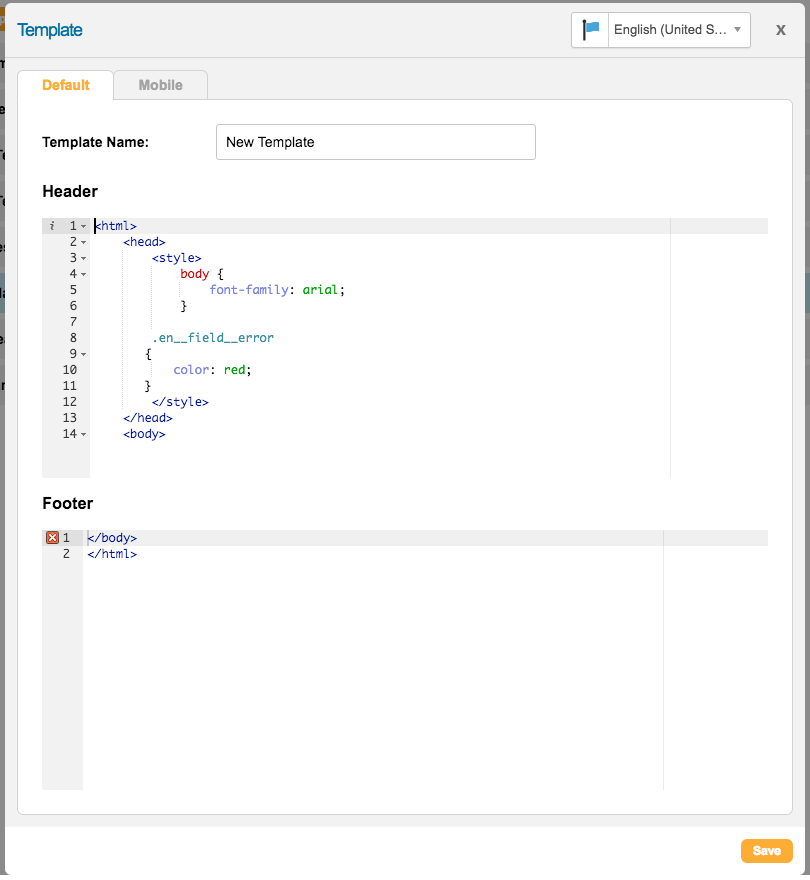Core Concepts
ENgrid and Page Builder Template Structure and Optimization
Engaging Network's Page Builder Templates are the HTML wrapper for your pages.
To view your templates, and to edit and create new ones, go to Pages > Components > Templates.

ENgrid Template Structure
The order of content and assets in the page template is intentional. Below is the breakdown of the logic and reasoning for everything.
Header Template (example markup)
Initialize the GTM Data Layer (assumes GTM is needed)
Has to come before everything, might as well be the first thing.
Commented out copy of Google Optimize w/ anti-flicker snippet
Commented out because even if it's not used, if it's turned on it will dramatically slow down page load time.
Favicons
Usually copied directly from organizational website
Meta Tags
These tags are here to provide Page Template level defaults for social sharing that can then be overwritten when Social Sharing Settings are configured on an individual page. This was extensively tested, no tags more / no tags less should be used. See: GitHub Issue #12
<!-- Sharing Meta Tags Used by Facebook-->
<title>${page~title} | TBD-ORG-NAME - TBD-ORG-TAGLINE</title>
<meta property="og:type" content="website">
<meta property="fb:app_id" content="1234567890"><!-- Optional -->
<!-- Social Sharing Meta Tags Used by Twitter-->
<meta property="twitter:account_id" content="0987654321"><!-- Optional -->
<meta name="twitter:site" content="@ABC"><!-- @username of website -->
<meta name="twitter:creator" content="@XYZ"><!-- @username of content creator -->
<meta name="twitter:card" content="summary_large_image">
<meta name="twitter:image" content="https://via.placeholder.com/1024x512.png?text=1024x512">
<meta name="twitter:title" content="${page~title}">
<meta name="twitter:description" content="Up to 160 character long description">
Preconnection
Begin the DNS handshake process for all URLs that will load assets. Replace the below with your domains in priority order of access.
<link rel="preconnect" href="//c27fdabe952dfc357fe25ebf5c8897ee.ssl.cf5.rackcdn.com">
<link rel="preconnect" href="//e-activist.com">
<link rel="preconnect" href="//www.googletagmanager.com">
<link rel="preconnect" href="//[www.google-analytics.com](www.google-analytics.com)">
Get color on the page with inline CSS
<style>
body {
background-color: #bfbfbf;
opacity: 0;
}
body[data-engrid-embedded] {
background-color: transparent !important;
}
</style>
Preload
Start to download the theme's CSS and logo before any other asset is downloaded.
<link rel="preload" href="TBD.css" as="style" />
<link rel="preload" href="TBD.svg" as="image" />
Noscript Message
A message for visitors without javascript enabled. Not really needed but wins points on some automated "Accessibility" testing software.
Detect if in an iFrame
Detect if the page is being served in an iFrame and add the corresponding class to the body so that it never renders in the wrong visual state.
<script>
if(window.self !== window.top)
{document.getElementsByTagName("BODY")[0].setAttribute("data-engrid-embedded", "");
};
</script>
Load ENgrid's CSS file
We load our CSS file here so that it comes after Engaging Network's CSS file which is inserted in <head>. If our CSS file in added right before </head>, Engaging Network's file will still come after it requiring you to use !important or other methods for winning CSS specificity when applying your styles.
In our testing a single CSS file performed better than multiple CSS files. This assumes a CSS file of reasonable size.
Preload fonts
Download render critical fonts without the need to read our CSS file first
<link rel="preload" href="TBD1.woff" as="font" type="font/woff" crossorigin>
<link rel="preload" href="TBD2.woff" as="font" type="font/woff" crossorigin>
<link rel="preload" href="TBD3.woff" as="font" type="font/woff" crossorigin>
Footer (example markup)
Additional Default meta tags
Like the other default meta tags, this exact setup is required for the optimal configuration
<!-- More Sharing Meta Tags Used by Facebook-->
<!-- EN adds these tags just before <body> so you need them here to override them -->
<link
rel="image_src"
href="https://via.placeholder.com/1024x512.png?text=1024x512"
/>
<meta name="title" content="${page~title}" />
<meta name="description" content="Up to 255 character long description" />
Load ENgrid's JS file
Loaded asynchronously and loaded here so our JS file here so it comes after all page content.
<script async src="TBD.js"></script>
Render Critical Javascript
Javascript that moves DOM components
- Contained in
main.js, but also included here as to not wait for it Javascript that loads lazy loaded images - Contained in main.js, but also included here as to not wait for it
Google Tag Manager
Add your GTM script here
ThreatMetrix
Our customized implementation of ThreatMetrix placed here so that it minimizes the impact on page load experience while still retaining support for the service.
Custom CSS
Place your temporary custom CSS here. Eventually all styles should be moved into the main.css file, but you can place them here until that happens.
Baked In Page Buider Layouts
Body Custom Attribute values for data-engrid-layout
leftleft1colcenterleft1colcentercenter1colcentercenter2colcenterright1colrightright1col
Example code block to your page, change to use the desired layout class:
<script>
const engrid = document.getElementsByTagName('BODY')[0]
engrid.setAttribute('data-engrid-layout', 'centercenter1col')
</script>
https://pastebin.com/raw/8jUMByU0
Error Styling
Body Custom Attribute for data-engrid-errors
fancy
Add HTML
For the addHtml function, the html parameter can be either a string (example: <strong>Fernando</strong>) or an Element.
- The target should be a string for query selector (example:
body, or.en__submit). - The position defaults to
before, but can be set asafter. - Combining only those 2 positions with the target element, you can add your component anywhere you want in the page.
addHtml(html, target, position)
Remove HTML
The removeHtml function expects a string for query selector (example: body , or .en__submit).
removeHtml(target)
ThreatMetrix
If you are implementing ThreatMetrix, be aware their suggested implementation kills page load performance. We have an alternative route that neuters how aggressively they profile the visitor and this approach has worked well enough for our clients. Your mileage may vary and if it's not stopping scammers / spammers, try reverting to their suggested installation.
Once you have their suggested embed code, you need to pull a few bits of client specific information out of it. In the code below replace the iFrame's ORGID and SESSIONID_PREFIX with their corresponding values which you can infer from your embed code. Then insert that updated markup as the last bit before the page template's closing </body> tag.
<tr>
<td>
<!-- Start ThreatMetrix Profiling Tag -->
<!-- The default ThreatMetrix installation murders page load performance -->
<!-- To optimize it we have removed the <script> tag and rely on the <iframe> for profiling 100% of site traffic -->
<iframe
style="width: 100px; height: 100px; border: 0; position: absolute; top: -5000px;"
src="https://h.online-metrix.net/fp/tags.js?org_id=ORGID&session_id=SESSIONID_PREFIX-${page~sessionId}&page_id=1"
></iframe>
<!-- End ThreatMetrix Profiling Tag -->
</td>
</tr>